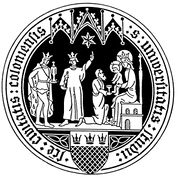University of Cologne
| University of Cologne | |
|---|---|
| Universität zu Köln | |
 |
|
| Established | 1388/1919 Closed 1798—1919 |
| Rector | Axel Freimuth |
| Academic staff | 508 |
| Students | 44,228 (WS 2006/07) |
| Postgraduates | 3,718 |
| Location | Cologne, North Rhine-Westphalia, Germany |
| Website | www.uni-koeln.de |
The University of Cologne (German Universität zu Köln) is one of the oldest universities in Europe and, with over 44,000 students, one of the largest universities in Germany. The university is part of the Deutsche Forschungsgemeinschaft, an association of Germany's leading research universities. It is further the German founding member of the Community of European Management Schools (CEMS).
Contents |
History
1388–1798
The University of Cologne was established in 1388 as the fourth university in the Holy Roman Empire after the Charles University of Prague (1348), the University of Vienna (1365) and the Ruprecht Karl University of Heidelberg (1386). The charter was signed by Pope Urban VI. The university began teaching on January 6, 1389. In 1798, the university was abolished by the French, who had invaded Cologne in 1794, because its professors, wishing to preserve their university’s independence, refused to swear an oath of allegiance to the French Republic. However, the last rector (Ferdinand Franz Wallraf) hid and so preserved the University’s Great Seal, now once more in use.
1919–today
In 1919, the by-then Prussian government endorsed a decision by the Cologne City Council to re-establish the university. On May 19, 1919, the then Lord Mayor Konrad Adenauer signed the charter of the modern university.
At that point, the university was composed of the Faculty of Commerce, Economics and Social Sciences (successor to the Institutes of Commerce and of Communal and Social Administration) and the Faculty of Medicine (successor to the Academy of Medicine). In 1920, the Faculty of Law and the Faculty of Arts were added, from which latter the School of Mathematics and Natural Sciences was split off in 1955 to form a separate Faculty. In 1980, the two Cologne departments of the Rhineland School of Education were attached to the university as the Faculties of Education and of Special Education.
The University is a leader in the area of economics and is regularly placed in the top three for law and commerce.

Organization
The University of Cologne is operated by the Federal State of North Rhine-Westphalia. The university is divided into six faculties, which together offer 200 fields of study. The faculties are those of Management, Economics and Social Sciences, Law, Medicine (with the affiliated University clinic), Arts, Mathematics and Natural Sciences and Human Sciences.
Rector
On November 24, 2004, Axel Freimuth was elected as the Rector of the University. His four-year term began on April 1, 2005. He succeeded Tassilo Küpper and is the 49th Rector since 1919. He was previously Dean of Mathematics and Natural Sciences.
Students and faculty

In 2005, the University enrolled 47,203 students, including 3,718 graduate students. In 2003, the number of post-doctoral students was 670.
The number of international students was 6,157 in the Summer Semester of 2005. This amounts to approximately 13% of the total students. Those from developing countries made up about 60%, representing a total of 123 nations. The largest contingents came from Bulgaria (10.5%), Russia (8.8%), Poland (7.4%), China (6.2%) and Ukraine (5.7%).
There are 508 professors at the university, including 70 women. In addition, the university employs 1,549 research assistants, with an additional 765 at the clinic, and 1,462 other assistants (3,736 at the clinic).
Notable alumni and professors
Over the centuries, scholars from Cologne have been among the most prominent in their fields, beginning with Albertus Magnus and his pupil Thomas Aquinas (both 13th century). Notable alumni of the 20th century include among others Kurt Alder (Nobel Prize in Chemistry 1950), Peter Grünberg (Nobel Prize in Physics 2007), Heinrich Böll (Nobel Prize for Literature), Karl Carstens (president of the Federal Republic of Germany 1979 – 1984), Gustav Heinemann (president of the Federal Republic of Germany 1969 to 1974), Karolos Papoulias (current president of the Hellenic Republic), Amos Grunebaum (famous US obstetrician), and Erich Gutenberg (founder of modern German business studies).
Literature
University history
- Erich Meuthen: Kölner Universitätsgeschichte, Band I: Die alte Universität, 1988, ISBN 3-412-06287-1
- Bernd Heimbüchel und Klaus Pabst: Kölner Universitätsgeschichte, Band II: Das 19. und 20. Jahrhundert, 1988, ISBN 3-412-01588-1
- Erich Meuthen (Hrsg.): Kölner Universitätsgeschichte, Band III: Die neue Universität – Daten und Fakten, 1988, ISBN 3-412-01688-8
External links
- Website of the University of Cologne (English)
- Erich Meuthen: Kleine Kölner Universitätsgeschichte (German)
- Absolventennetzwerk der Universität zu Köln (German)
- University of Cologne for foreign students on iAgora – Reviews by former Erasmus and other international students in Cologne
|
|||||